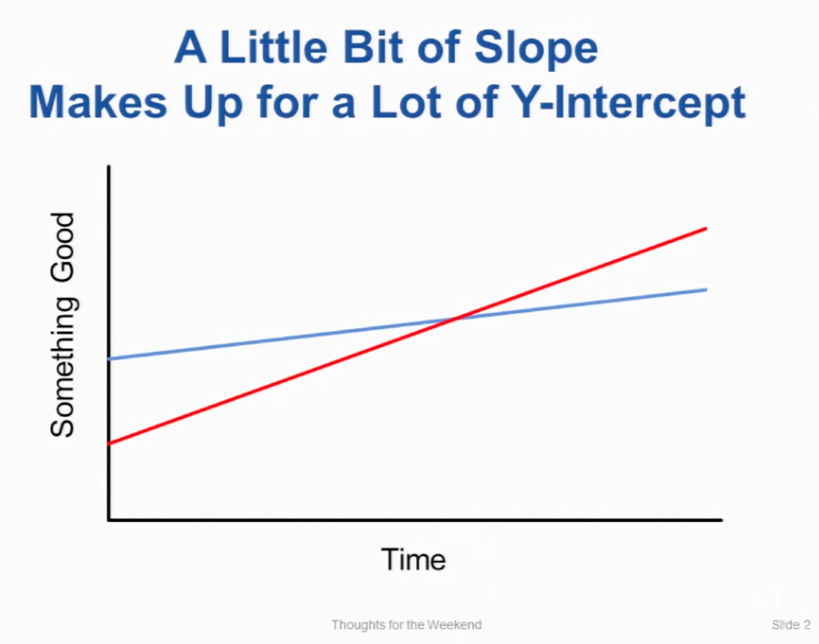01/13/2012. From a lecture by Professor John Ousterhout at Stanford, class CS140
Here's today's thought for the weekend. A little bit of slope makes up for a lot of Y-intercept.
[Laughter]
So at a mathematical level this is an obvious truism. You know if you have two lines, the red line and the blue line and the red line has a lower Y-intercept but a greater slope then eventually the red line will cross the blue line.
And if the Y-axis is something good, depending on your definition of something good, then I think most people would pick the red trajectory over the blue trajectory (..unless you think you're going to die before you get to the crossing point).
[Laughter]
So in a mathematical sense it's kind of obvious. But I didn't really mean in a mathematical sense, I think this is a pretty good guideline for life also. What I mean is that how fast you learn is a lot more important than how much you know to begin with. So in general I say that people emphasize too much how much they know and not how fast they're learning.
That's good news for all of you people because you're in Stanford and that means you learn really, really fast. This is a great advantage for you. Now let me give you some examples. The first example is: you shouldn't be afraid to try new things even if you're completely clueless about the area you're going into. No need to be afraid about that. As long as you learn fast you'll catch up and you'll be fine.
For example I often hear conversations the first week of class where somebody will be bemoaning, "Oh so-and-so knows blah-blah-blah, how am I ever going to catch up to them?" Well, if you're one of the people who knows blah-blah-blah it's bad news for you because honestly everyone is going to catch up really quickly. Before you know it that advantage is going to be gone and if you aren't learning too you're going to be behind.
Another example is that a lot of people get stuck in ruts in their lives. They realize they're in the wrong job for them. I have the wrong job or the wrong spouse or whatever…
[Laughter]
And they're afraid to go off and try something new. Often they're worried, I'm going to really look bad if I go..
[Laughter]
I'm kidding about the spouse. But, seriously people will be afraid to try some new thing because they're worried they'll look bad or will make a lot of rookie mistakes. But, I say, just go do it and focus on learning.
[Laughter]
Let me take the spouse out of the equation for now.
[Laughter]
Focus on the job.
Another example is hiring. Before I came back to academia a couple of years ago I was out doing startups. What I noticed is that when people hire they are almost always hire based on experience. They're looking for somebody's resume trying to find the person who has already done the job they want them to do three times over. That's basically hiring based on Y-intercept.
Personally I don't think that's a very good way to hire. The people who are doing the same thing over and over again often get burnt out and typically the reason they're doing the same thing over and over again is they've maxed out. They can't do anything more than that. And, in fact, typically what happens when you level off is you level off slightly above your level of competence. So in fact you're not actually doing the current job all that well.
So what I would always hire on is based on aptitude, not on experience. You know, is this person ready to do the job? They may never have done it before and have no experience in this area, but are they a smart person who can figure things out? Are they a quick learner? And I've found that's a much better way to get really effective people.
So I think this is a really interesting concept you can apply in a lot of different ways. And the key thing here I think is that slow and steady is great. You don't have to do anything heroic. You know the difference in slopes doesn't have to be that great if you just every day think about learning a little bit more and getting a little bit better, lots of small steps, its amazing how quickly you can catch up and become a real expert in the field.
I often ask myself: have I learned one new thing today? Now you guys are younger and, you know, your slope is a little bit higher than mine and so you can learn 2 or 3 or 4 new things a day. But if you just think about your slope and don't worry about where you start out you'll end up some place nice.
Ok, that's my weekend thought.
[Applause]

This is very nice🔥🔥